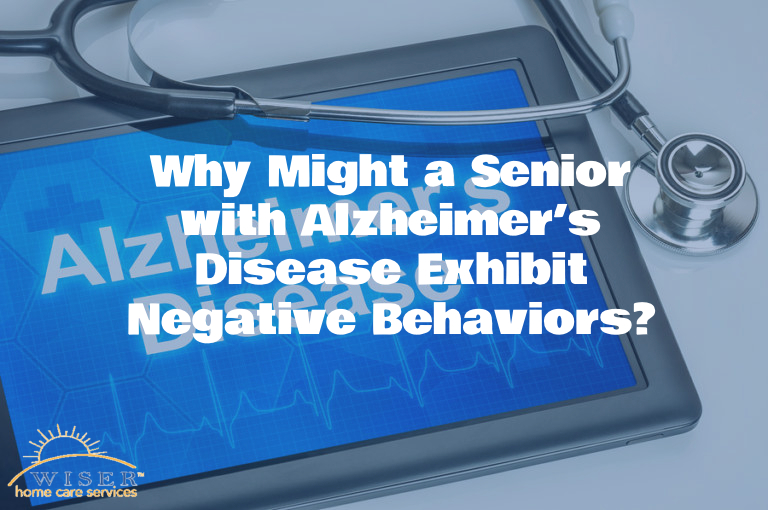When many people think of Alzheimer’s disease, the only thing that comes to mind is memory loss. While the loss of memory is a central symptom of Alzheimer’s disease, it is by no means the only way cognitive decline is manifested in those living with Alzheimer’s disease. As a family caregiver, it is extremely important for you to understand that this disease can impact your senior in a wide variety of ways, and you must understand these ways in order to give them active and meaningful care.
For some elderly adults living with Alzheimer’s disease, these challenges and symptoms can manifest as negative behaviors. Agitation, anger, combativeness, suspicion, repetitive behaviors, lashing out, and more can all be stark and upsetting deviations from your senior’s usual personality and behavior, and can be very difficult for you to cope with. By better understanding why these negative behaviors can occur in a senior, you can reassure yourself as a family caregiver to give your senior the care and support they need to get through these difficult experiences.

At the core of negative behaviors that occur in seniors with Alzheimer’s disease is the decline in that person’s cognitive abilities. This decline causes them to not be able to interpret the world around them, or even what is happening within their own body. This can be very upsetting and alarming to them. Further, due to their reduced ability to communicate, they are not properly able to express what they are going through. This can then result in negative behaviors.
Some of the factors that can lead to negative behaviors in a senior with Alzheimer’s disease include:
- Hunger or thirst.
- Pain.
- Infections, such as a urinary tract infection.
- Being in an unfamiliar environment.
- Being near unfamiliar people.
- Over-stimulation.
- Confusion or disorientation.
- Fear, such as due to sundowners.
- Misinterpretation of your intentions or emotions.
- Response to your own emotions and how you are interacting with them.
- Boredom.
No matter how dedicated you are to being a family caregiver for your elderly parent, when you are helping them cope with the challenges of Alzheimer’s disease, it can be difficult, or even impossible, for you to take on all of these responsibilities on your own. Arranging for help does not mean you don’t want to be a family caregiver. It also doesn’t mean that you don’t care about the effectiveness of the care your senior receives. Instead, accepting help, such as hiring an elderly care provider, is a nurturing and meaningful way to show your senior how much you love them, and that them getting all the care and assistance they need is important to you.
An elderly home care services provider offers completely customized services tailored specifically to your aging loved one. This means they will get the care that they need, when they need it. Allowing them to maintain as much independence, health, safety, and fulfillment as possible at the age in place.
If you or an aging loved-one are considering elderly care in Tacoma, WA, please contact the caring staff at Wiser Care Services. Phone: (877) 279-5530. Serving all of Pierce County and South King County.
Sources
https://www.alz.org/alzheimers-dementia/facts-figures
https://www.alz.org/alzheimers-dementia/stages
https://www.alz.org/help-support/caregiving/stages-behaviors

